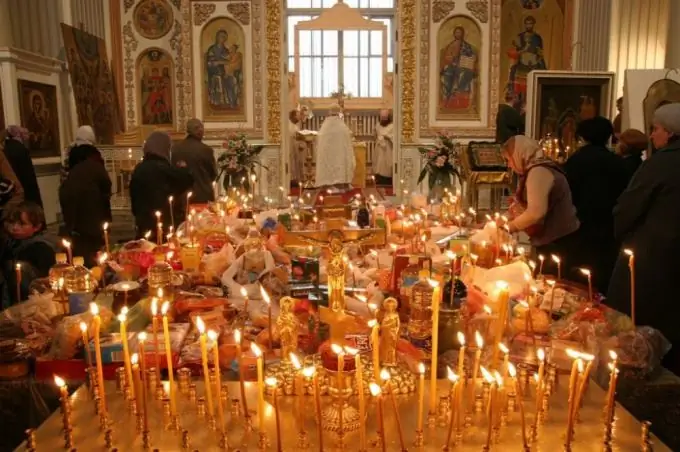- Author Antonio Harrison [email protected].
- Public 2023-12-16 07:44.
- Last modified 2025-01-22 21:44.
Often in Orthodox churches, near the tetrapod (a candlestick for commemorating the dead), you can see various food products on the table. This is due to the fact that believers bring various foods to the temple to commemorate their deceased loved ones.

The main Orthodox principle of honoring the memory of the deceased is to offer a prayer “for the forgiveness of sins” and the granting of peace to the soul, as well as the desire for good deeds in memory of those who have finished their earthly journey. Alms, expressed in the offering of food to the temple, is not just evidence of the memory of the deceased, but shows a person's love for the deceased. Usually, notes are enclosed in food bags, on which the names of those who need to be remembered for the repose are written. This is done so that the clergy and other ministers of the parish offer prayers for the dead at a meal in memory of the deceased.
It is worth remembering that a certain practice has developed in the Church, according to which not all food products can be brought to the temple on certain days of the church liturgical year. It is not supposed to bring meat for commemoration, since it is not customary in the Church to bring the product of a slain animal into the house of God.
Before giving alms, you need to familiarize yourself with the Orthodox calendar, check if there is a fast at the moment. If the period of abstinence continues in the Church (or the calendar Wednesday and Friday fall), then no fast food is brought to the church. On such fast days, it is necessary to put on the memorial table food blessed by the holy Church as food for the time of saving abstinence. For example, vegetables, cereals, fish (if there is no Great or Dormition Lent), seafood. This practice is very logical, because the clergy will not eat meager food on the days of fasting to commemorate the deceased.
When the church calendar provides for the absence of fasting, it is permissible to bring dairy products, eggs, cheeses, etc. (with the exception of meat) to the memorial table.
On Radonitsa (the ninth day after Easter) eggs, Easter and Easter cakes are most often used as products for commemoration. However, there is no specific church decree in this, therefore, each person, to the best of his ability, decides for himself what charity to commit. The main thing in this matter is pure thoughts, good nature and love for neighbors, accompanied by fervent prayer for them.






